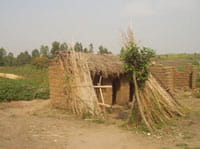The Primary Health Care Promotion Programme (Programme de Promotion des Soins de Santé Primaires – PPSSP) carried out a study in collaboration with Tearfund and the Overseas Development Institute to find out why so few people in DRC have access to sanitation. The study explored the issues that hinder progress at both national and local levels. At national level, we researched national policies and institutions. At local level we carried out focus groups to identify the influences on people’s attitudes and behaviour.
Issues for public policy
The first thing that some people think of when sanitation is discussed is a latrine. However, sanitation is wider than that. UNESCO and the World Bank define sanitation as ‘Maintaining clean, hygienic conditions that help prevent disease.’
Using this definition, activities relating to sanitation include:
- the supply, distribution and treatment of clean water
- safe disposal of excreta, treatment of sewage and industrial waste, reducing water pollution
- collection and disposal of rubbish
- the fight against insects, snails, rodents and other disease carriers
- monitoring the safety of foods, including the treatment of milk; the processing, storage and distribution of meat, poultry, fish and bakery products; hygiene in restaurants and bars
- monitoring the cleanliness of schools and public places
- the fight against air pollution due to smoke, dust, gases and odours.
Challenges
The research found many factors that hinder the promotion of sanitation and hygiene. These include:
- poor coordination between different government ministries which each have partial responsibility for sanitation
- lack of political priority given to sanitation, where there are many competing demands on government
- lack of a national policy on sanitation and hygiene
- laws related to sanitation that are out of date, little known and disrespected
- shortage of competent, qualified staff because it is not an attractive sector to work in and because the staff are either unpaid or paid very little
- lack of financial support for the sector and lack of public infrastructure. For example, there are not enough public waste disposal sites and refuse collectors
- lack of involvement of women in debates and decision-making in the sector, even though women are actively involved in sanitation work at household level and in public areas
- the weight of tradition, where defecation in the bush or throwing rubbish on the road is not seen as a problem
- urbanisation and population growth, which make management of waste very difficult in towns.
A ray of hope
PPSSP have been using the findings of this study to raise the profile of the sanitation problem in DRC. We have advocated for improved policies and practice. We presented the findings to a group of decision-makers at a workshop in Kivu province, and there are signs of positive change.
The authors work for the PPSSP (Programme de Promotion des Soins de Santé Primaires), which is a consortium of Tearfund partners in the Democratic Republic of Congo. Email: [email protected]. For the full report of the study Sanitation and hygiene in developing countries: identifying and responding to barriers, visit: http://tilz.tearfund.org/Research/Water+and+Sanitation
+Reports/ where it can be downloaded in English or French, or email: [email protected] to request a paper copy in English.









